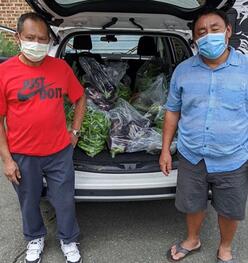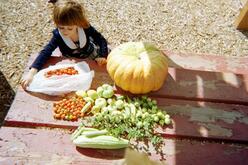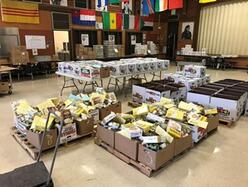Food insecurity in the United States has risen by a historic amount with over 54 million people in the U.S. projected to be food insecure this year.
People are considered food secure when they "at all times, have physical, social, and economic access to sufficient, safe and nutritious food that meets their dietary needs and food preferences for an active and healthy life (FAO).

Food banks across the U.S. have seen a 55% increase in the number of people seeking help and are unable to meet the high demand.
High rates of unemployment and Covid-19 infection among New American community members have contributed heavily to lack of stable access to adequate amounts of nutritious food. Refugees and immigrants have been some of the hardest hit populations in the country, disproportionately experiencing food and nutritional insecurity due to their high rates of employment in the “gig economy” and other job sectors heavily impacted by the pandemic such as food, hospitality, and health care.
A survey of immigrant communities conducted in 16 languages in Massachusetts in July 2020 found that 59% of the households reported that they do not have enough food to eat. Among households with at least one undocumented family member, that jumps to 78%. Although some immigrants are eligible for public pandemic relief benefits, they do not always feel safe accessing them. According to a study by the Urban Institute, “1 in 7 adults in eligible immigrant families – 13.6% – reported that they did not enroll in programs like Medicaid, the Children's Health Insurance Program (CHIP), the Supplemental Nutrition Assistance Program (SNAP) and housing subsidies last year because of worries that it would affect their legalization efforts.”
IRC staff report food access as a recurrent and urgent need in their offices. Even pre-pandemic food access surveys showed that in 2019, despite the food support that many of our clients receive, food insecurity impacted around a quarter of surveyed clients. Since the pandemic began, soaring food access needs were met with insufficient supply at local food banks, and back logs in local benefit offices that to this day can’t catch up with the unemployment and supplemental nutrition assistance (SNAP) needs, leaving the most critically vulnerable populations with few options to feed their families.

Since March 2020, IRC responded to our community’s food security needs immediately, mobilizing teams in each of our 25 U.S. offices to help reach the most vulnerable with food and cash support. Alongside case management and health teams, IRC’s New Roots food security and agriculture program network have been at the center of the emergency food response. New Roots was initially founded 10 years ago in San Diego to support refugees in accessing land and agribusiness activities. It has since grown to 10 locations and a myriad of programs supporting food access, nutrition and agriculture for refugees and their communities, reaching about 13,000 people annually. Since March 2020, New Roots has pivoted their usual programming to respond to emergency needs of IRC clients and their communities by sourcing and delivering over 475,000 pounds of food to more than 6,000 people. Moreover, IRC refugee farmers have been leaders in providing food from their fields to the families that need it most.
The IRC’s food security response in the pandemic has been supported by the generosity of existing donors who have allowed for more flexibility to facilitate our response to this crisis. However, as families across the U.S. continue to struggle to provide adequate nutritious meals, existing funding is insufficient to meet the soaring need. In light of this urgent need, IRC seeks emergency funding to support a holistic national response sensitive to contextual needs and realities.
Food security needs in 2021 and beyond
Since April 2020, through coordinated efforts in IRC offices, New Roots and Resettlement teams have reached over 6,000 families with 475,000 pounds of groceries and locally grown food. 10% of that food came from New Roots Refugee Farmers. The receiving families included refugees, asylees and their community members.

Key takeaways
- Many clients in need of food security support have been in country longer than 30 days and out of their initial resettlement period, often due to unemployment and delays in benefits.
- Most local food donation services are in very high demand and clients often cannot get timely access to culturally-appropriate food they need for their families.
- IRC staff across the U.S. have responded not only to existing clients but to the entire community
- Job creation and food support: IRC clients themselves are an integral part of the emergency food response, growing and delivering food to their community and beyond while earning an income.
- Farming and gardening have played an important role in promoting health and food sovereignty and access to fresh produce
- Children and undocumented people continue to be the hardest hit community that the IRC serves
- Lack of consistent funding has been a hindrance to consistent and planned efforts to support IRC clients with food access
- While immediate food assistance is an urgent need, it is imperative to also build sustainable pathways to future food stability, food and nutrition security and autonomy. As IRC prepares to welcome more newly arrived refugees in the Fall of 2021, our offices need to shore up their monitoring and response systems to support client food insecurity. Providing support to staff to be able to survey clients on their food security needs weekly is critical to reaching the most marginalized and destitute populations who are cut off from other public services like food stamps and COVID relief aid. In the long term – IRC would not only provide food support but also help families navigate future opportunities to help return to the workforce safely. This requires going beyond food delivery: it is a multi-pronged approach that includes education around healthy eating, community resources and employment support buffered by timely client feedback.
How you can help: Ensure food security for all IRC US clients and their communities
IRC has launched the Emergency Food Security Project (EFSP) to support high-quality food assistance efforts across 25 offices in the U.S. The proposed programming would build on an existing proven effort to expand and streamline pathways to client food security and to improve IRC’s ability to reach the most vulnerable for the coming year.
Support from generous individuals, business leaders and like-minded organizations IRC will enable the IRC to source, store and deliver food, engage partners and volunteers and build capacity to assess community needs and measure impact on client wellbeing. At least 40% of food provided to refugees, asylum-seekers and immigrants will be produced by local farmers, including New Roots farmers. Local projects will be implemented in accordance with community needs. This project would not only support direct food assistance for those who need it most but also support local farmers and economies further benefiting local, minority rich communities.
Thank you for your interest in helping ensure that refugee, asylum-seeking and immigrant families who have been hardest-hit by the pandemic are able to provide for this most basic need.
Learn more
Learn more about food insecurity and the ways in which New Roots increases access to healthy food.
You can also visit our volunteer page to see if there is an opportunity to get involved in a New Roots near you.